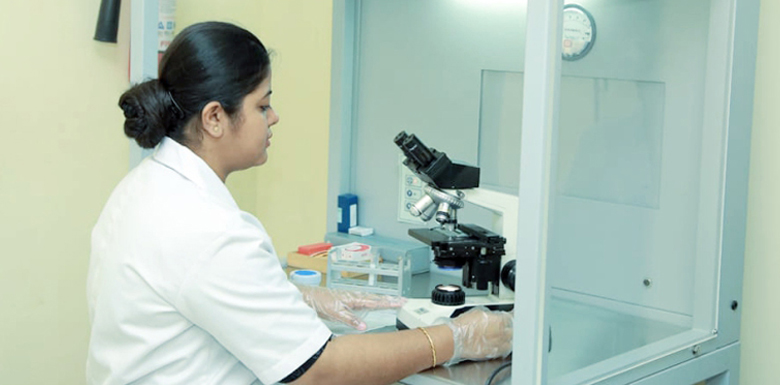IVF (In vitro fertilization) / ICSI (Intracytoplasmic sperm injection) is the most advanced treatment for infertility when simpler methods fail. It is also useful for couples with bilateral tubal block, severe endometriosis and very low sperm counts.
A typical in vitro fertilisation (IVF) cycle lasts between 3 and 4 weeks. The procedure is begun by administering the female partner with fertility drugs for 8-10 days through daily hormone injections from Day 2 or Day 3 of the menstrual cycle. This process stimulates the ovaries into producing more eggs than they would otherwise. During this period, routine ultrasounds and blood tests are performed to monitor progress.
- Egg Collection
Egg collection is a simple, painless procedure that usually lasts only half an hour. During this process, the eggs produced by mature follicles are retrieved with the help of a needle attached to a scan probe. Although the procedure doesn’t hurt, it may make you slightly queasy, which is why it is performed under anaesthesia. It is a single day procedure requiring patient admission of three to four hours only.
- Fertilization
Once we have collected an array of eggs and sperm from you and your partner, we carefully fuse them together to create several embryos. You may be recommended additional technologies such as preimplantation genetic screening (PGS), preimplantation genetic diagnosis (PGD) and intracytoplasmic sperm injection (ICSI) to help improve the quality of the resultant embryos. Alternatively, you may be advised a simple IVF procedure.
- Embryo development
During the fertilisation phase, we would have ensured that we created several embryos which can now be graded for quality by their appearance and integrity.
- Embryo Transfer
An embryo transfer is the last part of the in vitro fertilization (IVF) process. The embryos obtained after IVF/ICSI are placed inside the uterus under ultra-sound guidance. The patient will be given medicines to improve the thickness and quality of the inner lining of the uterus, prior to embryo transfer. This is a painless procedure and takes only a few minutes, not requiring anesthesia or admission.
- Embryo Freezing
Embryos can be freshly transferred into the uterus or can be kept frozen to be transferred in any subsequent cycle. Surplus embryos are also kept frozen for many years should you require a subsequent pregnancy.
Follicular study is the first step of your fertility treatment, if the basic tests are normal. This is the serial monitoring of ovaries for growth of follicles which contain eggs using transvaginal ultrasonography. This typically comprises 2-3 visits on alternate days or as suggested by your doctor. It is usually done after the patient is given medicines or injections to grow eggs.
Once ovulation happens, you will be advised to try naturally. After 2-3 weeks, a urine pregnancy test can confirm pregnancy. In the unfortunate event of the patient being unable to conceive after a few cycles, you would be advised to undergo further tests and proceed with other treatment options such as IUI.
Intrauterine Insemination (IUI) helps you conceive if the sperm count is low, the male partner has erectile/ejaculatory dysfunction or simple ovulation induction fails. IUI is a simple, painless, outpatient procedure, wherein the partner’s sperms are deposited inside the uterus. Usually the sperms are obtained on the day of the procedure. Alternatively, in case of any inconvenience to be physically present on the day, we offer semen freezing.
Semen freezing is a process by which semen samples are collected well in advance and kept frozen for a long period of time.
IUI increases the number of sperms that reach the fallopian tubes, subsequently increasing the chance of fertilization. It gives the sperm a head start, still requiring it to reach and fertilize the egg on its own. It is simpler, less invasive and less expensive, compared to IVF (in vitro fertilization).
Before intrauterine insemination, ovulation-stimulating medications may be used, during which follicular study will be necessary to determine when the eggs are mature. The IUI procedure takes a few minutes and is performed after 24 to 36 hours of ovulation trigger.
A semen sample, washed by the lab to separate the semen from the seminal fluid, will be inserted directly into the uterus using a soft catheter. This maximizes the number of sperms that can be placed in the uterus, increasing the possibility of conception.
Microscopic examination of semen is one of the preliminary and most important tests when you have difficulty conceiving. Semen is analyzed in our dedicated Andrology Laboratory by a trained embryologist to ascertain the count, motility (movement) and morphology (shape) of sperms. The examination of the semen does not require any specific period of abstinence from sex. Our facility has clean semen collection rooms. The results can be obtained within one hour.
With men who are Azoospermic (who don’t have any sperms in semen), Testicular Sperm Aspiration (TESA) can retrieve sperms directly from the testis if they function properly. These surgically obtained sperms can be fused with the partner’s egg to produce embryos.
In donor programmes, sperms or eggs from screened and suitable donors are used. The donor sperms can be used for IUI/IVF/ICSI.
Donor programmes are useful in situations:
- When a man has low counts or no sperms and is willing to accept a donor sperm
- When the female partner is unable to produce eggs due to various reasons like menopause, premature ovarian failure, advanced age factor or in case of repeated IVF/ICSI failures using her own eggs
Eggs are retrieved from the donor after stimulating her ovaries. The partner’s sperms are fused with these donor eggs in the laboratory and the resulting embryos can be transferred to the partners womb.
- Donor Embryo
When both the male and female partners are infertile, they can opt for the donor embryo program. The embryo is developed using the donor sperm and donor eggs, and is implanted in the uterus of female partner.

